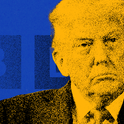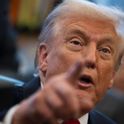The Australian
5th February 1996
At first glance, it could be a Blue Mountains Sunday barbecue just like any other: open shirts and children's voices; new-mown grass and crates of Carlton; the smell of charbroiled sausages in hot, still air.
But look again, and the tell-tale signs emerge: the odd sprinkling of electronic equipment on the lawn; the security men with nervous eyes; the strange preponderance, in the crowd, of mobile phones: a special guest, an unusual guest, is approaching. Indeed, as John Derum, actor, Australian Labour party member and host for the afternoon, quips, "It's not every day you get to welcome a prime minister to your back yard." But there is Mr Derum along with his wife Jane, sons Oliver and Clancy, a few hundred friends and the travelling legions of the media-waiting to greet Paul and Annita Keating. The visitors arrived and were guided down towards a platform with a soft view over green waves of forest.
It proved, somehow, a magic, protective setting. Campaign pressures seemed suddenly a world away; birds gave their liquid calls; there were shadows moving in the gum trees; women in print dresses; old folk in straw hats; men with open, curious faces all glanced up.
And the transformation took place. At first slowly, hesitantly, Paul Keating-the old Paul Keating-began, as if warmed by the light, colour, mood around him, to speak. No notes, no artifice; just what was on his mind, prompted by the place, the words of introduction, the moment in the campaign. It was as though the past week of haggard televised appearances, bad polls and unhappy by-elections had never happened at all.
What Australia meant to him; the land, the Aborigines, their place, and rights, and all the tasks ahead; the relations between the people and the government; the sense Australians have of themselves, and the "great bequest we've been given with this continent." These were his subjects. As he spoke on, people began to edge slowly forward; the children on the trampoline stopped jumping; the mobile phones rang and went unanswered. Mr Keating looked out to the green horizon, the angophoras and turpentine gums to his left, the wood-slatted house on the hillside. He narrowed his eyes, and began speaking of the "unique nature of the Australian bush, the Australian landscape." "Oh please God," said one of the party faithful in the crowd: "If only everyone in the country could see him, and hear him, like this!"
Almost despairingly, she wiped away a tear: "I just can't imagine hearing a better speech." A rosella swooped on cue, above the podium; the mood shifted. Time for the stinging attacks on the political enemy, and another aspect of Mr Keating's character unfurled itself.
He spoke of John Howard's false green credentials; how grievously the conservation movements had been duped by the Liberal leader's protestations: "The Marvin Hamlisch music must have been playing-how does it go now...?" And the prime minister of Australia proceeded, unabashed, to give an elegant, half-crooned rendition of a swing tune for the benefit of his enraptured listeners.
Speechifying done, he mingled, and his cares seemed to drain away. "Should have brought your sombrero, Paul," said one old-timer, but Mr Keating only smiled and worked the crowd. A man in braces with an Elvis tie, women with their hair dyed various shades of copper, kids in baseball caps-for each one, he had a smile, an autograph, a word of confidence.
The watching members of the media shook their heads, and judged Mr Keating's words, and tried to make sense of what they were seeing: a champion performance at a tiny, low-key barbecue, after days on end of stumblings in the television studios. Perhaps it had been a turning point; perhaps just another enigma, in a Labour campaign of missed opportunities.











